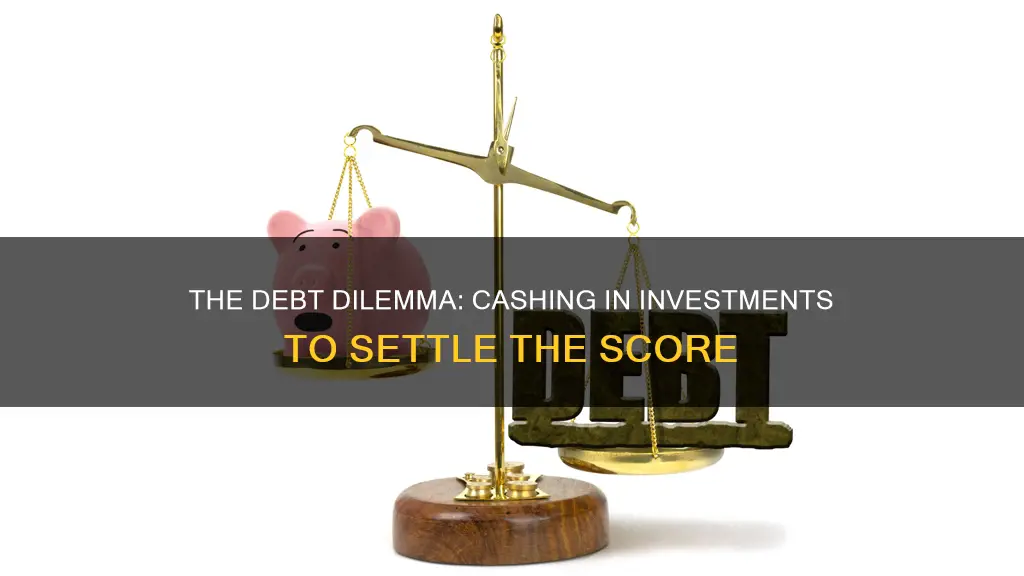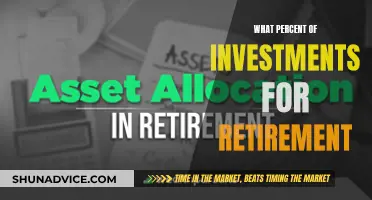
Whether to cash in investments to pay off debt is a complex decision that depends on several factors, including interest rates, investment returns, and individual financial goals and circumstances.
A general rule of thumb is to compare the interest rate on your debt with the expected return on your investments. If your debt interest rate is higher, prioritising debt repayment may be more financially prudent. Conversely, if your expected investment returns exceed your debt interest rate, investing could be a better option.
However, this decision is not always straightforward, as investment returns can be volatile and difficult to predict accurately. Additionally, there are tax implications and potential impacts on long-term financial goals to consider when cashing in investments.
It is essential to weigh the benefits of both options and make an informed decision based on your specific circumstances. Seeking guidance from a financial advisor can be helpful in navigating this complex financial choice.
| Characteristics | Values |
|---|---|
| Should I cash in investments to pay off debt? | It depends on the interest rate of the debt and the expected rate of return on investments. |
| When to cash in investments to pay off debt? | If the interest rate on your debt is higher than the expected rate of return on your investments. |
| When not to cash in investments to pay off debt? | If the interest rate on your debt is lower than the expected rate of return on your investments. |
| What to consider before cashing in investments? | The tax implications, the impact on long-term financial goals, and the opportunity cost of withdrawing money from your portfolio. |
| Alternatives to cashing in investments? | Pause contributions to investments and redirect cash flow towards debt repayment, use a line of credit from your investment portfolio, or consolidate debt with a lower-interest loan. |
What You'll Learn

Weigh up the interest rate on your debt against the return you expect on your investments
When deciding whether to cash in investments to pay off debt, it's important to weigh up the interest rate on your debt against the return you expect on your investments. This is a complex decision that requires careful consideration of various factors. Here are some key points to keep in mind:
Firstly, if your debt has a relatively high-interest rate, especially above 6%, it is generally advisable to prioritise paying off that debt before investing additional funds towards retirement. High-interest debt, such as credit card debt, can accumulate quickly and cost you more in the long run. By paying off such debt first, you can prevent further interest charges from adding to your balance.
On the other hand, if you have a lower interest rate on your debt, investing your extra cash may be more advantageous. This is because lower interest rates give your long-term investments a better chance to outperform the savings you would achieve by paying off your debt faster. However, it's important to remember that investments can be volatile, and their returns may fluctuate over time.
Another factor to consider is your risk tolerance. Investing in the stock market or similar vehicles can be risky, and you should evaluate your comfort level with potential losses. If you are comfortable with the inherent volatility of investments, then investing may be a suitable option. However, if the thought of market fluctuations keeps you up at night, paying down your debt may be a more psychologically appealing choice.
Additionally, it's important to think about your credit score. Paying down debt, especially credit card debt, can improve your credit utilisation ratio, which is a significant factor in calculating your credit score. A higher credit score can benefit you in several ways, such as lower interest rates on future loans and improved chances of securing a mortgage or car loan.
In conclusion, the decision to cash in investments to pay off debt depends on multiple factors, including interest rates, expected investment returns, risk tolerance, and credit score considerations. It may be beneficial to seek advice from a financial professional to help you weigh up these factors and make an informed decision that aligns with your financial goals and risk appetite.
Solar Energy: The Rapid Return on Investment
You may want to see also

Consider the tax implications of selling investments to pay off debt
When deciding whether to cash in your investments to pay off debt, it is important to consider the tax implications. If you sell investments in a taxable brokerage account, you will need to pay capital gains tax on the gains you make from the sale. The amount of tax you will pay depends on how long you have held the investments. If you have held the investments for a year or less, you will pay the short-term capital gains rate, which is the same as the rate on your ordinary income. Depending on your total taxable income, this could be anywhere from 10% to 37%. If you have held the investments for longer than a year, you will pay the long-term capital gains rate, which is lower, at 0%, 15%, or 20%, again depending on your income.
If you sell investments from a retirement account, there may also be tax implications. Withdrawing money from a 401(k) or traditional IRA before the age of 59 1/2 will generally result in a 10% early withdrawal penalty, as well as income taxes. With a Roth IRA, you can withdraw your contributions at any time tax-free, but if you withdraw any earnings before the age of 59 1/2, you will have to pay a 10% penalty.
It is also worth noting that selling investments to pay off debt means missing out on future growth in those investment accounts. This can have a significant impact on your long-term financial situation, as you will lose the potential for compounding returns on your investments. Therefore, it is important to carefully consider the tax implications and potential opportunity costs before deciding to cash in your investments to pay off debt.
France: A Smart Investment Move
You may want to see also

Assess the impact on your long-term financial situation
There are several factors to consider when assessing the impact of cashing in your investments to pay off debt on your long-term financial situation. Firstly, you need to evaluate the potential taxes and penalties associated with early withdrawal from investment accounts. For example, cashing out mutual funds may result in capital gains tax, and early withdrawals from retirement accounts like IRAs can trigger income taxes and penalties. These additional costs can reduce the amount of money available to pay off your debt.
Another important consideration is the opportunity cost of cashing in your investments. By selling off mutual funds or other investments, you lose the potential for future growth and compound interest. Investments, especially those with a long-term horizon, often offer significant returns over time. Cashing out early means missing out on these potential gains, which could impact your long-term wealth accumulation.
Additionally, it's crucial to assess the interest rates on your debt. If you have high-interest debt, such as credit card debt, paying it off should be a priority. The interest charges on such debt can quickly accumulate, outweighing any potential returns from your investments. However, if the interest rate on your debt is relatively low, investing your money instead may be more advantageous, especially if you expect higher returns on those investments.
It's also important to consider your risk tolerance and financial goals. Investments can be volatile, with values fluctuating over time. If you are comfortable with the potential ups and downs of the market, investing may be a suitable option. However, if you are risk-averse or losing sleep over your debts, paying off your debt first may be a better choice for your peace of mind and financial stability.
Finally, it's worth exploring alternative options for debt repayment. Instead of cashing in your investments, you could consider refinancing your loans at a lower interest rate, consolidating your debt, or exploring debt relief programs. By assessing these various factors and weighing them against your financial goals and risk tolerance, you can make an informed decision about the impact of cashing in your investments to pay off debt on your long-term financial situation.
February: A Month for Investing?
You may want to see also

Explore alternative options for paying off debt
There are several options for paying off debt, and it can sometimes feel overwhelming. Here are some alternative options to cashing in your investments to pay off your debt:
- DIY strategy: This involves creating a budget, negotiating lower payments with creditors, and finding ways to increase your income through side hustles or freelance work.
- Debt consolidation: This involves taking out a loan to pay off your existing debts, ideally at a lower interest rate. This can be done through a balance transfer credit card, debt consolidation loan, or by borrowing from a 401(k) or home equity. However, it's important to note that borrowing from a 401(k) or using home equity can put your retirement savings or home at risk.
- Debt relief: This includes options such as debt management plans, bankruptcy, and debt settlement. Debt management plans involve working with a credit counselling agency to create a budget and negotiate lower interest rates with creditors. Bankruptcy can involve either erasing unsecured debt or being placed on a court-approved repayment plan. Debt settlement, often offered by for-profit companies, allows you to pay off your debt in one lump sum that is less than the total amount owed, but it can have negative consequences for your credit score and report.
- Budgeting: Getting clear on your budget may help you find extra money to put toward debt repayment. This can be done through various budgeting systems such as the zero-based approach, the envelope system, or the 50/30/20 budget. Technology and budget apps can also make budgeting easier.
- Negotiating lower bills: Contacting service providers and negotiating lower rates on expenses like your phone bill, energy bill, car insurance, or cable service can free up more money to put toward debt repayment.
Investing: Nice People Turn Nasty
You may want to see also

Consult a financial advisor
Consulting a financial advisor can be a great way to help you decide whether to cash in your investments to pay off debt. Here are some reasons why:
Expertise and Experience
Financial advisors are trained and experienced in managing debt and investments. They can provide valuable insights and guidance based on their knowledge of the market, interest rates, and investment strategies. They can help you analyse your debt, create a budget, and develop a plan to reduce it over time.
Holistic Financial Planning
Financial advisors take a holistic approach to your financial goals. They will consider your short-term and long-term objectives, risk tolerance, and other factors to create a comprehensive plan. This may include recommending that you keep certain investments for the long term while also creating a strategy to pay off your debt.
Prioritising Debts
A financial advisor can help you prioritise which debts to pay off first. They will typically recommend paying off debts with the highest interest rates, such as credit card debt, to minimise the impact of compound interest. They can also advise on debt restructuring and consolidation options, such as taking out a home equity loan to pay off high-interest credit card debt.
Creating an Emergency Fund
Financial advisors often suggest building an emergency fund to cover unexpected expenses. This can provide peace of mind and help you avoid taking on additional debt in the future. They can recommend low-risk and liquid investment options for your emergency fund.
Referrals and Connections
Financial advisors often have a network of professional connections that can be beneficial. They may refer you to reputable credit counselling organisations, debt relief companies, or tax professionals. They can also connect you with other specialists, such as estate planners, to ensure your financial plan is comprehensive.
Emotional Support and Accountability
Working with a financial advisor can provide emotional support and accountability. They can help you stay motivated and disciplined in paying off your debt. While it may be uncomfortable to discuss your spending habits and financial decisions, a good financial advisor will provide non-judgmental guidance and help you make positive changes.
Remember to choose a qualified and reputable financial advisor who is a fiduciary and always acts in your best interest. They should be transparent about their fees and provide you with a detailed plan in writing. By consulting a financial advisor, you can make informed decisions about cashing in your investments to pay off debt and improve your overall financial well-being.
Wall Street's Annual Investors
You may want to see also
Frequently asked questions
It depends on the interest rate of your debt. If you have high-interest debt, such as credit card debt, it is generally recommended to pay this off first. However, if you have debt with a low-interest rate, such as an auto loan or mortgage, it may be better to invest your money, as you can expect to earn more on your investments in the long term.
There are two main drawbacks to cashing out investments to pay off debt: taxes and the potential impact on your long-term financial situation. If you sell investments at a profit, you may owe capital gains tax, which can be as high as 37% if you held the investments for less than a year. Additionally, by selling off investments, you lose their potential for significant growth over time, especially if you have been reinvesting dividends.
Yes, there are several alternatives to consider before cashing out your investments. You can pause contributions to your investments and redirect that cash flow towards paying off high-interest debt. You can also use a line of credit from your investment portfolio, which means borrowing against your brokerage account without triggering taxes. Another option is to consolidate your debt with a lower-interest loan or a balance transfer credit card.







